MAINTENANCE AND INFORMATION GUIDE
Cabinet Maintenance And Information
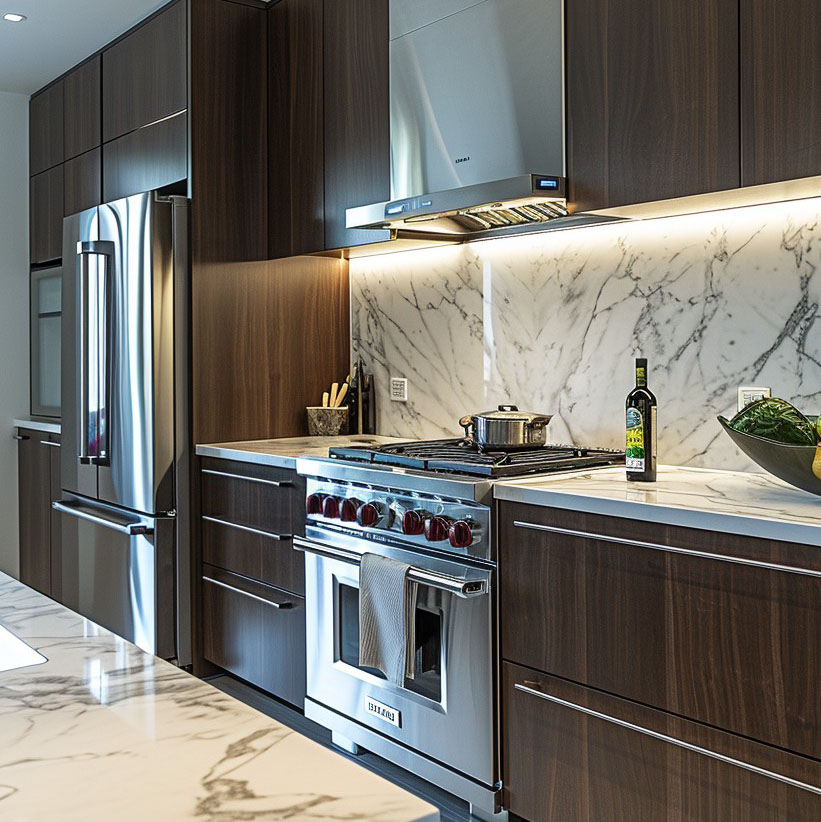
kitchen cabinets require just as much maintenance and cleaning care as any other item in the household. The lifespan of the cabinet is based on how they are cleaned. Always use a clean soft cloth dampened with mild soap and warm water to clean residues from smoke, cooking vapours, grease and hand or body oils. A quick dry dusting may scratch the cabinet surfaces if done with a dry cloth.
Helpful Hint: If wood cabinetry is used, always wipe in the same direction as the wood grain for your regular cleaning.
🧼 Recommended Cleaning Method
Use warm water mixed with a small amount of dish soap (not dishwasher liquid) and a soft, damp cloth like cotton or white microfiber. Dish soap is safe, effective, and gentle on skin—great for wood, painted doors, and most finishes.
🚫 Avoid These
- Abrasive sponges or colored cloths
- Dish towels or rough materials
- Harsh cleaners, waxes, silicones, or polishes
🧻 After Cleaning
Dry with a soft cloth or paper towel to prevent damage.
DO:
• Wipe up spills promptly and dry completely. Especially in areas near the sink, stove, dishwasher, on joints, and around any cutouts. This includes kitchen and bathroom cabinets.
• Clean routinely to avoid long-term damage from water, food, smoke, grease, and oil buildup.
• Keep the finish dry, whether painted wood, laminate surfaces, solid wood, or melamine.
• Clean with a white lint-free cloth or microfiber. Use dish soap and warm water (not dishwasher liquid). Follow up with clean water and wipe dry.
DON’T:
• Wipe up spills promptly and dry completely. Especially in areas near the sink, stove, dishwasher, on joints, and around any cutouts. This includes kitchen and bathroom cabinets.
• Clean routinely to avoid long-term damage from water, food, smoke, grease, and oil buildup.
• Keep the finish dry, whether painted wood, laminate surfaces, solid wood, or melamine.
• Clean with a white lint-free cloth or microfiber. Use dish soap and warm water (not dishwasher liquid). Follow up with clean water and wipe dry.
countertop care
Quartz Countertop
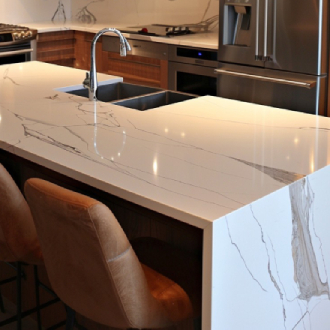
DO:
• Use warm soap and water or a mild detergent and rinse and wipe dry completely.
• Gently scrub using a sponge/fiber pad and mild soap for tough, dried food or grease.
DON’T:
• Don’t expose to strong chemicals, such as paint removers, oven cleaners, etc.
GRANIT Countertop
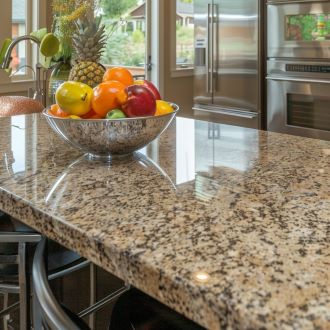
DO:
• Always use heat trivets or hot pads when placing hot objects.
• Clean with a soft clean cloth, mild soap and warm water.
• Use enough water to properly clean and rinse without saturating the countertop for a long period of time.
DON’T:
• Do not use cleaning products with any kind of acid or abrasive.
laminate countertop
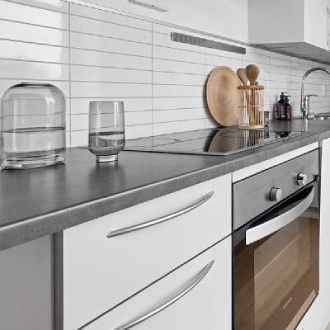
DO:
• Clean regularly with mild soap and water
• Use enough water to properly clean and rinse without saturating the countertop for a long period of time.
• For tough, dried food or grease, gently scrub using a sponge/fiber pad and mild soap.
DON’T:
• Don’t set hot appliances or pans directly on the laminate.
• Don’t use harsh abrasive cleansers.
• Don’t use steel wool or scrubbing tools containing steel wool.
• Don’t use a laminate countertop as a cutting board.
• Always use heat trivets or hot pads when placing hot objects on any surface
wood countertop
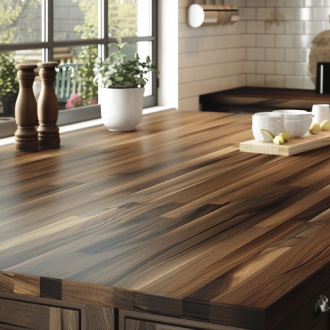
DO:
• Wood is porous, so wipe up any spills with a damp cloth to prevent water damage and stains.
• For general cleaning, mix a few drops of gentle dish soap with warm water and scrub the surface with a sponge or cloth.
• For stains, sprinkle salt over the stain, cut a lemon in half, and scrub the stain with the lemon.
DON’T:
• Don’t set hot appliances or pans directly on the wood.
• Don’t use harsh abrasive cleansers.
• Don’t use steel wool or scrubbing tools containing steel wool.
• Avoid cutting or chopping directly on the butcher block.
• Do not saturate the countertop with water or let standing water sit on the surface.
Corian countertop
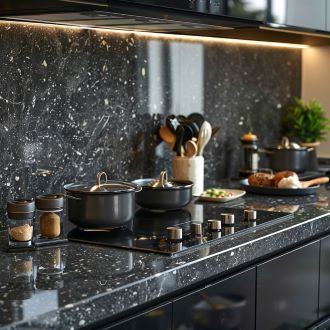
DO:
• Use warm soapy water, ammonia based cleaner, (not window cleaners) rinse and wipe dry completely.
• Wipe countertop dry after spills or cleaning.
• While Corian solid surface is heat resistant, it is important to minimize direct heat exposure.
• Always use a trivet under portable heat-generating appliances such as toaster oven.
DON’T:
• Don’t expose Corian to strong chemicals, such as paint removers, oven cleaners, etc.
• Do not cut directly on Corian® countertops.
